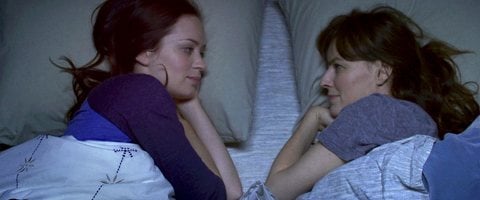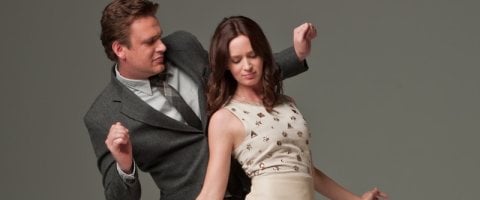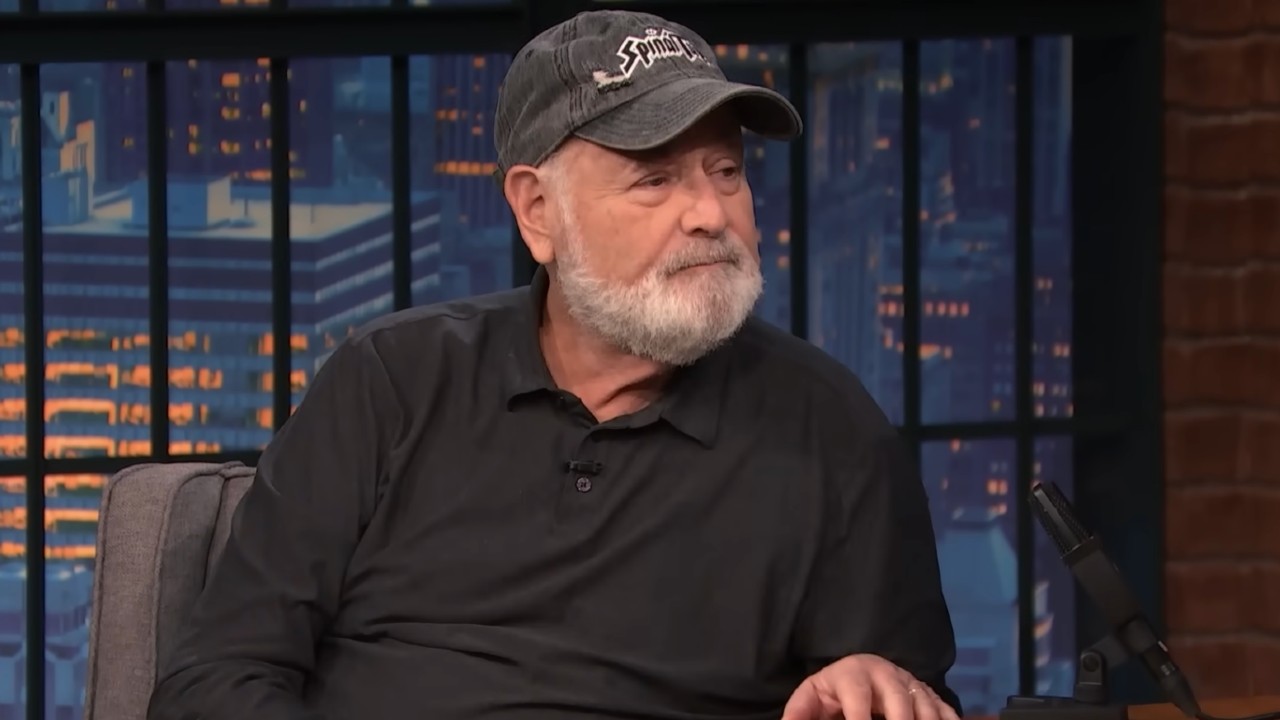Emily Blunt Talks Learning To Be Funny And Building Chemistry In Salmon Fishing In The Yemen

Though she's been popping up all over the place for years, first as the tart assistant in The Devil Wears Prada and then as the eponymous queen in The Young Victoria or in indies like Sunshine Cleaning and Wild Target. But Emily Blunt has never quite been as ever-present, or showing as much range, as she is this year. First out of the gate is Salmon Fishing in the Yemen, now in theaters and setting up Blunt with Ewan McGregor as two unlikely allies helping a rich Middle Eastern sheikh establish salmon fishing in his desert country.
But she's far from done-- in just a week and a half she'll be starring opposite Jason Segel in the broad comedy The Five-Year Engagement, and later this summer she appears in a very different kind of comedy, Lynn Shelton's largely improvised and very intimate Your SIster's Sister, with Rosemarie DeWitt and Mark Duplass. She'll close things out with Looper, Rian Johnson's twisty time-travel thriller than just premiered a fabulous trailer. Each of these roles is markedly different from the other, so if you didn't know what kind of amazing range Blunt has yet, you surely will by this fall.
I caught up with Blunt a few weeks ago to talk primarily about Salmon Fishing in the Yemen, how she built her clipped, prim character and how the film's humor took her by surprise. But we also talked about her adjustment to improv and intimate filmmaking in Your Sister's Sister, and how Segel and director Nicholas Stoller gave her a major role in developing the script for The Five Year Engagement. We also talked briefly about the role chemistry plays in the film's she's made, particularly last year's The Adjustment Bureau, and how it's something you recognize when you have it.
Check out the rest of the interview below, and see Salmon Fishing in the Yemen in theaters now.
Lasse Hallstrom had this reputation from the 90s as this ultimate prestige director, with The Cider House Rules--
And Gilbert Grape and stuff. I've seen that movie so many times. It was very popular in my class. All the girls were in love with Johnny Depp.
So did Hallstrom have that huge reputation in your mind too?
Your Daily Blend of Entertainment News
Yeah, when I heard he was going to direct this I was thrilled, because you really need someone with a light touch, and someone who was really interested in people and the dynamics between them, and what makes them tick. In all of his films there's something quite smart and grown-up about them, but an incredibly human heartbeat.
I don't think I expected it to be this funny.
Yeah, it's really quirky. I guess people don't know quite what to expect when you hear the title. A lot of the humor comes from the character of Dr. Alfred, who's so uptight and repressed. That creates a really nice dynamic between him and Harriet.
There was something in the press notes about how she was written to be more uptight as well, and you changed it.
Yeah, I don't know. I think Lasse said that. I thought that the way she dealt with Dr. Alfred was really funny, because she refused to be offended, even with his huge attempts to be appalling and rude. She just found him baffling and amusing. I thought that showed a character with warmth, who could more just roll her eyes at someone. I like people like that. I liked her spirit.
Is that something you can look for in general with scripts you get, to find a warmer side that's not necessarily in the script?
It's hard to sum up what you necessarily look for or try and change about the character, because it's your personal take on it. The way I would play it might be different from how someone else would. I just really loved her and played her as best I could. She really did bounce off the page as being quite buoyant and tenacious.
Did you change your voice for this role?
Yeah, it's a bit posher. It just happened, really. I don't make a point of saying, "I'm going to speak like this and change my voice." I feel like every time I change my accent other people comment on it. I think it just happens subconsciously. I feel how that character feels in my skin. It all starts from the inside out really, thinking about a character and where she comes form. And then all the physical stuff sort of comes afterwards. It's hard to explain, because I don't know how aware of it I am.

I think about how relaxed Your Sister's Sister is, and it's all about the intimacy and being around people you know, and how that would bring an entirely different physical thing.
Yeah, I didn't think about that either. Maybe it's all osmosis, the more you think about it, the more something else happens. I find it really hard to talk about the process of it, I find it real tricky. Also you sound a bit wanky if you talk about it too much. In Sister's Sister, I hardly knew Mark and Rosemarie, yet I was playing one of the most intimate relationships you can have in your life, your sister or your best friend. I was lucky enough to have wonderfully open, really generous co-stars, and we all just sat around at night after the day's work and shared stories. It's a very personal film for all of us.
And that's something you go to a Lynn Shelton film for, as opposed to something like this, which is much bigger.
Yeah, everything's different that you do, and it doesn't really matter the scale of it, but I think you have to be quite clear of the tone and what the tone of the movie is. Something like a Lynn Shelton movie is mainly improvised, so there is something incredibly freeing and exhilarating about working like that.
Does it take a while as an actor, after being part of a lot of large movies, does it take a while to be able to assert yourself on a set like that and really be part of the process?
No, I always feel part of the process ,and the more I've gone on and the more I've done it, the more experience I have, probably the more I'm allowed to have a say and a collaboration. especially in Lynn's process you are like the front seat and front row of collaboration on that. You're doing it, you're writing it, you're doing it. I don't tend to approach movies differently depending on the scale or the budget.
After going through those things, do you take something from each role in terms of building your confidence or your skill?
I think you do grow more confident. I feel like my confidence has grown when it comes to listening to your gut, and I think also you get confidence to be more open and accessible to other ideas and other notes. I think you're willing to try, you're willing to go there, especially if you're working with a director you like, if they tell you to go down another avenue, you've got the guts to go down there, because you never know. You never know how a scene will turn out. I love that way of working, that spontaneous, fly-by-the-seat-of-your-pants way of working, and not overly preparing. That's something I recognize now. Maybe when I was starting out, I remember doing TV dramas and sitting in my bedroom, when I was living with my mom and dad, rehearsing and rehearsing, and feeling a bit jarred when they didn't go the way I imagine them. I think it's best to just say "Who knows."
I imagine Five-Year Engagement was a lot of improv as well.
Yes, it was a lot of improv. It was a fantastic script as well. Jason wrote it with me in mind, he knows me quite well and knows my voice, and again those guys encourage me to come into the writers' room with a few ideas, and they were fantastically open, and did a big rewrite for me and ideas that I had. And then on the day we do it straight, then you start stretching the scenes around and end up adding a lot more that you didn't imagine to be on the page. I think the best comedy can come out of some kind of spontaneity, because it's all reactions, comedy is all reactive in a way.
When The Adjustment Bureau came out, even people who didn't really love the movie as a whole liked the chemistry between you and Matt Damon. I wonder if you feel that differently than relationships with other co-stars, if that chemistry is felt in real life.
I don't know really. I find chemistry is this weird, ethereal thing, that you can't really box in and sell it. You either have it with someone or you don't.

Do you know that you have it when you're doing it?
Yeah, you know you work well together. I think it's about working well together, and usually the best chemistry I've had with people is when I've had a very lovely, warm, natural rapport with them off set. And Matt became a friend of mine, and Ewan became a really good friend of mien, and that translates onscreen somehow. And the dialogue was quite witty between Matt and I. They spoke in ways that I understood. There's so many different factors into why two people have chemistry. But it is a weird thing, I don't know how to sum it up, why you click with someone and why you don't. The space between you is a bit more sparkly or something, it's odd.
With the different kinds of movies you made, not just movies but comedies, and then different ways you've learn to be funny onscreen.
You're either funny or you're not! I don't know if movies teach you that. Well you do it in different ways. What do you learn about what comedy takes out of you, and what you like or what you want to do?
It's interesting, because I think I find it hard to talk about comedy too, because it's about timing and a kind of innate thing that I think you can do or you can't do. Comedy is actually more technical than anything else, in terms of timing, and it's quite precise. How you hit a line can alter it, and how you tonally sound on a line can completely shift how funny it is or not. You've got to let people find it with that, because that sort of back and forth can be so precise. And also when you want the spontaneity of not quite knowing what's coming. The best directors I've worked with are when they give you an environment to play. Don't just take the first take, because there could be so much more that could happen. I've just learned so much about giving it some space to explore it.
Staff Writer at CinemaBlend

